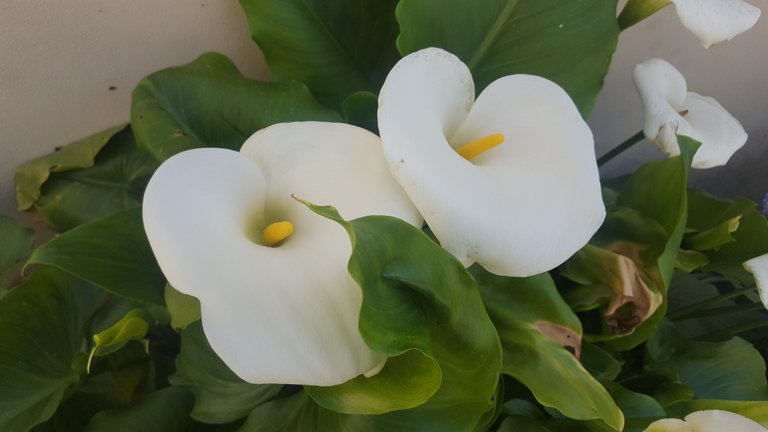Sundays... a day for relaxing, or as is my case, the day I process all the information crammed in my head during two full days of back-to-back graduate school.
My housemate decided that the spring warmth had finally reached a level where she could put all the plants outside. I only moved in last month, so I had no idea that the copious cactus and succulents in the house were actually outdoor plants brought in to avoid the winter chill. She also keeps the outdoor plants covered during the winter with a protective, breathable tarp that allows them to get some sun, but avoid the frost, so walking into the little backyard area today was a burst of color and freshness!
One of the most beautiful plants out there--and there are many--was this Arum-lily (Zantedeschia aethiopica):

It was so gorgeous that I had to take a picture. Looking at the delicate flowers and protective leaves got me to thinking, "Why would anyone cut these and bring them indoors?" To me it is obvious that the flowers are part of the greater ecosystem that is the plant and all the other plants around.
I have never really understood cut flowers. To me, it is like cutting off someone's beautiful hair and putting it on display in your house. If I think a flower is beautiful, I will either bring the whole plant into the house or in cases when that is not possible, take a picture.
Can someone who loves cut flowers
help me understand why you do it?
I genuinely want to understand. Do you cut flowers because you don't think the plant is aware? Do you even think about it at all?
I look forward to learning from you!
Hai proprio ragione @yvesoler non ho mai capito neanche io questa cosa di tagliare fiori e portarli... cono una data di scadenza dal momento in cui si tagliano di li a breve...! Vuoi fare un regalo? porti un'orchidea con i fiori, non solo uno stelo floreale! Bella foto comunque, anche io ho delle calle e ogni anno mi innamoro sempre più del loro bianco, per non parlare di altri ibridi e specie dai colori insoliti, giallo violetto ecc.
Sono pienamente d'accordo. So che tagliamo le piante per il cibo, i prodotti, ecc., ma in quei casi si transforma la pianta, è una relazione che ha una continuità nel tempo. Mi sembra inutile e francamente egoista tagliare una pianta solo perché vuoi. Come hai detto giustamente, portiamo la pianta stessa alla persona, così si crea una nuova relazione tra persona e piante, una relazione che può durare degli anni invece dei giorni!
Yeah, I've never really understood cutting flowers. Whenever I give flowers to my mom or wife I always but the whole plant in a container...it's amazing (sarcasm) these things actually replicate and you can get even more flowers if you have the whole plant!
I am with you, @danielshortell! I had a friend that told me that she only cuts flowers from her own bushes once she feels they have reached the phase where they begin dying. Her theory is that if she brings them indoors, she can bring the connection she has with that plant into the home and admire the beauty until the very end. In some ways, it makes sense.
She is the first person that has given me an answer that showed she really thought of the plant. Most other people just tell me that they want the beauty for themselves with no regard to the plant it came from. Unfortunately, that seems indicative of other problems in our society, but I digress...
Ok, I get your friend's logic, sort of sweet and well thought out actually.
On another platform, someone told me that it was ok to cut a flower because it would grow back. From a purely biological perspective, that is true. My question went beyond that and goes to our interaction with the plant world at a deeper level. The comment is like saying that it is OK to take away the baby of a woman because she can technically have another one. An extreme example, or is it? In this case, you are taking away the flower for no other need than because you want it.
We are only starting to understand the awareness and intelligence of the plant world, and while their logic is different than our own, it is these critical questions that are necessary if we are to create a new, sustainable relationship with the natural world. Just because we have always done it does not mean it was right or wrong. Years ago we did not know that plants have memory, create family bonds, and can choose to deviate nutrients to prevent the death of another. With every new discovery comes the need to re-evaluate our relationship with plants, even if it means changing behavior we thought to be innocuous.